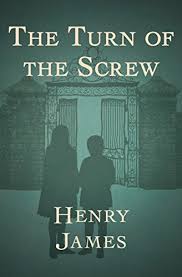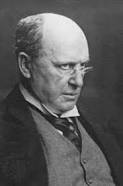The Turn of the Screw Page #3
The Turn of the Screw is an 1898 horror novella by Henry James that first appeared in serial format in Collier's Weekly magazine. In October 1898 it appeared in The Two Magics, a book published by Macmillan in New York City and Heinemann in London.
“Which was—?” “That she should never trouble him—but never, never: neither appeal nor complain nor write about anything; only meet all questions herself, receive all moneys from his solicitor, take the whole thing over and let him alone. She promised to do this, and she mentioned to me that when, for a moment, disburdened, delighted, he held her hand, thanking her for the sacrifice, she already felt rewarded.” “But was that all her reward?” one of the ladies asked. “She never saw him again.” “Oh!” said the lady; which, as our friend immediately left us again, was the only other word of importance contributed to the subject till, the next night, by the corner of the hearth, in the best chair, he opened the faded red cover of a thin old-fashioned gilt-edged album. The whole thing took indeed more nights than one, but on the first occasion the same lady put another question. “What is your title?” “I haven’t one.” “Oh, I have!” I said. But Douglas, without heeding me, had begun to read with a fine clearness that was like a rendering to the ear of the beauty of his author’s hand. I I remember the whole beginning as a succession of flights and drops, a little seesaw of the right throbs and the wrong. After rising, in town, to meet his appeal, I had at all events a couple of very bad days—found myself doubtful again, felt indeed sure I had made a mistake. In this state of mind I spent the long hours of bumping, swinging coach that carried me to the stopping place at which I was to be met by a vehicle from the house. This convenience, I was told, had been ordered, and I found, toward the close of the June afternoon, a commodious fly in waiting for me. Driving at that hour, on a lovely day, through a country to which the summer sweetness seemed to offer me a friendly welcome, my fortitude mounted afresh and, as we turned into the avenue, encountered a reprieve that was probably but a proof of the point to which it had sunk. I suppose I had expected, or had dreaded, something so melancholy that what greeted me was a good surprise. I remember as a most pleasant impression the broad, clear front, its open windows and fresh curtains and the pair of maids looking out; I remember the lawn and the bright flowers and the crunch of my wheels on the gravel and the clustered treetops over which the rooks circled and cawed in the golden sky. The scene had a greatness that made it a different affair from my own scant home, and there immediately appeared at the door, with a little girl in her hand, a civil person who dropped me as decent a curtsy as if I had been the mistress or a distinguished visitor. I had received in Harley Street a narrower notion of the place, and that, as I recalled it, made me think the proprietor still more of a gentleman, suggested that what I was to enjoy might be something beyond his promise. I had no drop again till the next day, for I was carried triumphantly through the following hours by my introduction to the younger of my pupils. The little girl who accompanied Mrs. Grose appeared to me on the spot a creature so charming as to make it a great fortune to have to do with her. She was the most beautiful child I had ever seen, and I afterward wondered that my employer had not told me more of her. I slept little that night—I was too much excited; and this astonished me, too, I recollect, remained with me, adding to my sense of the liberality with which I was treated. The large, impressive room, one of the best in the house, the great state bed, as I almost felt it, the full, figured draperies, the long glasses in which, for the first time, I could see myself from head to foot, all struck me—like the extraordinary charm of my small charge—as so many things thrown in. It was thrown in as well, from the first moment, that I should get on with Mrs. Grose in a relation over which, on my way, in the coach, I fear I had rather brooded. The only thing indeed that in this early outlook might have made me shrink again was the clear circumstance of her being so glad to see me. I perceived within half an hour that she was so glad—stout, simple, plain, clean, wholesome woman—as to be positively on her guard against showing it too much. I wondered even then a little why she should wish not to show it, and that, with reflection, with suspicion, might of course have made me uneasy. But it was a comfort that there could be no uneasiness in a connection with anything so beatific as the radiant image of my little girl, the vision of whose angelic beauty had probably more than anything else to do with the restlessness that, before morning, made me several times rise and wander about my room to take in the whole picture and prospect; to watch, from my open window, the faint summer dawn, to look at such portions of the rest of the house as I could catch, and to listen, while, in the fading dusk, the first birds began to twitter, for the possible recurrence of a sound or two, less natural and not without, but within, that I had fancied I heard. There had been a moment when I believed I recognized, faint and far, the cry of a child; there had been another when I found myself just consciously starting as at the passage, before my door, of a light footstep. But these fancies were not marked enough not to be thrown off, and it is only in the light, or the gloom, I should rather say, of other and subsequent matters that they now come back to me. To watch, teach, “form” little Flora would too evidently be the making of a happy and useful life. It had been agreed between us downstairs that after this first occasion I should have her as a matter of course at night, her small white bed being already arranged, to that end, in my room. What I had undertaken was the whole care of her, and she had remained, just this last time, with Mrs. Grose only as an effect of our consideration for my inevitable strangeness and her natural timidity. In spite of this timidity—which the child herself, in the oddest way in the world, had been perfectly frank and brave about, allowing it, without a sign of uncomfortable consciousness, with the deep, sweet serenity indeed of one of Raphael’s holy infants, to be discussed, to be imputed to her, and to determine us—I feel quite sure she would presently like me. It was part of what I already liked Mrs. Grose herself for, the pleasure I could see her feel in my admiration and wonder as I sat at supper with four tall candles and with my pupil, in a high chair and a bib, brightly facing me, between them, over bread and milk. There were naturally things that in Flora’s presence could pass between us only as prodigious and gratified looks, obscure and roundabout allusions. “And the little boy—does he look like her? Is he too so very remarkable?” One wouldn’t flatter a child. “Oh, miss, most remarkable. If you think well of this one!”—and she stood there with a plate in her hand, beaming at our companion, who looked from one of us to the other with placid heavenly eyes that contained nothing to check us.
Translation
Translate and read this book in other languages:
Select another language:
- - Select -
- 简体中文 (Chinese - Simplified)
- 繁體中文 (Chinese - Traditional)
- Español (Spanish)
- Esperanto (Esperanto)
- 日本語 (Japanese)
- Português (Portuguese)
- Deutsch (German)
- العربية (Arabic)
- Français (French)
- Русский (Russian)
- ಕನ್ನಡ (Kannada)
- 한국어 (Korean)
- עברית (Hebrew)
- Gaeilge (Irish)
- Українська (Ukrainian)
- اردو (Urdu)
- Magyar (Hungarian)
- मानक हिन्दी (Hindi)
- Indonesia (Indonesian)
- Italiano (Italian)
- தமிழ் (Tamil)
- Türkçe (Turkish)
- తెలుగు (Telugu)
- ภาษาไทย (Thai)
- Tiếng Việt (Vietnamese)
- Čeština (Czech)
- Polski (Polish)
- Bahasa Indonesia (Indonesian)
- Românește (Romanian)
- Nederlands (Dutch)
- Ελληνικά (Greek)
- Latinum (Latin)
- Svenska (Swedish)
- Dansk (Danish)
- Suomi (Finnish)
- فارسی (Persian)
- ייִדיש (Yiddish)
- հայերեն (Armenian)
- Norsk (Norwegian)
- English (English)
Citation
Use the citation below to add this book to your bibliography:
Style:MLAChicagoAPA
"The Turn of the Screw Books." Literature.com. STANDS4 LLC, 2025. Web. 9 Mar. 2025. <https://www.literature.com/book/the_turn_of_the_screw_330>.








Discuss this The Turn of the Screw book with the community:
Report Comment
We're doing our best to make sure our content is useful, accurate and safe.
If by any chance you spot an inappropriate comment while navigating through our website please use this form to let us know, and we'll take care of it shortly.
Attachment
You need to be logged in to favorite.
Log In